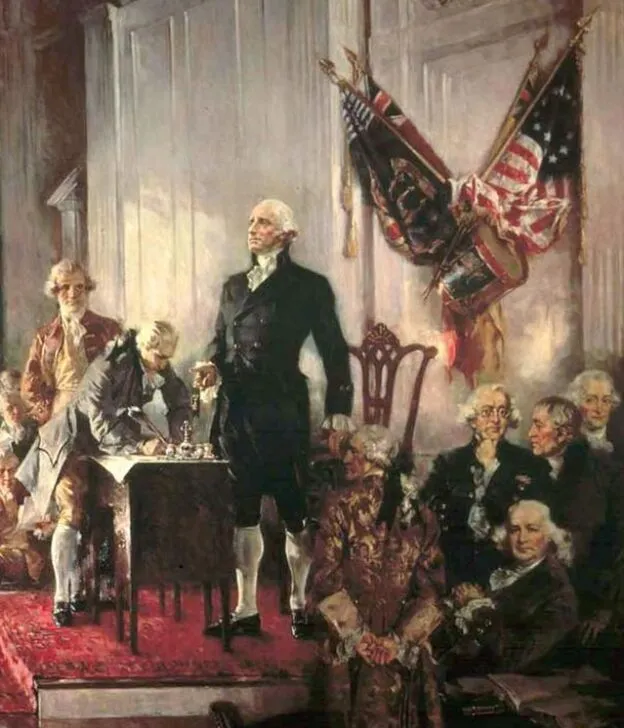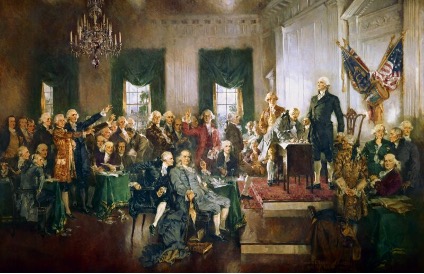
A Nation Forgetting Itself: The Cost of Civic Illiteracy
Great Americans have always understood that maintaining our freedom depends on passing down our founding principles and history through education.
Actions have consequences. A lack of consequences is an action that also has consequences.
America is in the throes of an epidemic of civic illiteracy that can be traced to a half-century of not teaching the principles, history, and documents of her founding. In our most prestigious universities down to primary school classrooms, the teaching of our pre-partisan founding principles and history has been downgraded and corrupted, leading to at least two generations of Americans without the knowledge to be participants in self-government or the resolve to defend our republic.
It isn’t as though we weren’t warned: by George Washington, who identified education in civics as an essential pillar of freedom in the earliest days of our republic, and much more recently by the late Supreme Court Justice Sandra O’Connor who reminded us that civic knowledge was not passed from generation to generation in the gene pool but, rather, must be taught and re-taught to each new class of rising Americans. Great Americans have always understood that maintaining our freedom depends on passing down our founding principles and history through education.
In the 20th century, Ronald Reagan also reminded us of freedom’s fragility. “It’s never more than one generation away from extinction,” he once said. “It is not ours by way of inheritance; it must be fought for and defended constantly by each generation, for it comes only once to a people.” He was channeling the insights of other great Americans, such as Abraham Lincoln and Frederick Douglass, who understood that our heritage of liberty is grounded in enduring moral truths about the equal dignity of all human beings.
Our heritage of liberty is grounded in enduring moral truths about the equal dignity of all human beings.
It seems as though those truths are no longer self-evident to our republic. Political violence is on the rise, and intolerance colors too many of our public debates and even private discussions. It is no exaggeration to say these are the sorry consequences of a civic illiteracy epidemic that has raged in our body politic, untreated, for years. Yet it would be wrong to blame this crisis merely on the emergence of competing narratives like the New York Times’ “1619 Project,” which traces U.S. history to the arrival of slaves on our shores and labels Americans as irredeemably racist. This and other such narratives filled a void that was created by a shameful inaction for civic education.
The civic education crisis our country faces seems to us to be part of a larger cultural malaise—one that fails to foresee the consequences of our inactions in other realms of our society and, then once demonstrated, fails to do anything about them. Consider, for instance, inactions to prosecute “petty” thefts under $1,000 that have led to an exodus of retailers no longer able to run their businesses in areas prone to these crimes. Similarly, cash-free bail has led to the release of repeat offenders into society, where they again commit crimes, some of them violent. Indeed, if our actions as a nation sometimes have had tragic consequences—in wars, segregation and financial mismanagement—so have we as Americans demonstrated the sometimes devastating results of our inactions.

It is not an overstatement to trace at least some of the problems of our society to an insufficient understanding of the rights and responsibilities of citizens in this free society and the values they must share. A requisite understanding of these starts in the home but must be further molded and honed in civic education classrooms throughout our educational system. Too often and in too many places, civic education inaction has won the day and, with it, a withering of our civic culture.
Perhaps the most troubling example of civic inaction’s dangers can be found in the rise of 20th-century totalitarianism. From Lenin and Stalin’s communist revolution in Russia to Hitler’s fascist takeover of Germany, tyrants took advantage of a lack of actions, pushbacks, in their early stages. Even when these regimes began to threaten the West, our own civic ignorance led to shortsighted policies of appeasement and even cooperation. The consequence was a shattered continent and the tragedy of war and genocide—over 6 million in the Holocaust alone, and 70 million over the course of World War II.
Peoples inspired with a greater confidence in their civic tradition, however, have the power to stop the march of tyranny.
While we, thankfully, do not currently face the kind of revolutionary extremism that led to catastrophe in the last century, our civic health is trending in the wrong direction. More and more young people are turning to socialism, communism, or other forms of radicalism because they have not been educated in how our American form of government provides the greatest individual freedom and opportunity. But the good news is that parents, educators, and philanthropists have had enough of this civics inaction. At our organization, the Jack Miller Center, we are taking a number of specific steps to reinvigorate civic education.
For more than two decades, we have supported the careers of university scholars devoted to teaching the principles and history of our country—in intensive, multi-week institutes that bring together new post-doctoral academics with the senior scholars in political science and history, and, once on campus, by supporting campus centers focused on this scholarship. In all, there are 1,300 of these academics—whom we call Jack Miller Fellows—on more than 300 higher-ed campuses.
In recent years, we have been engaging a growing number of these scholars in teaching graduate-level seminars for K-12 teachers, enriching their understanding of our founding documents and strengthening their ability to lead discussions and debates in their own classrooms—the hallmark of our democracy.
And today, the Jack Miller Center is helping to bolster and support a civics renaissance in higher education. Across the country, state legislatures are establishing Schools of Civic Thought at their flagship universities. These separate and independent academic units are sanctioned to teach our founding principles, American history, and Western civilization. Not only are Schools of Civic Thought restoring the traditional liberal arts for a new generation of college students, they are also providing training and content K-12 teachers can use in their classrooms. Schools of Civic Thought are rapidly expanding, and will be a major game changer.
Taken together, these efforts are helping to lead what can truly be called a civics renaissance in our classrooms and on our campuses. We join with others who have recognized the consequence of our inactions and the extraordinary influence that civic learning can have for America.
Reform must begin with acknowledging the crisis at hand: Due to generations of inaction, Americans are forgetting who we are supposed to be. “Something’s eating away at the national memory,” the popular historian David McCullough once said, “and a nation or a community or a society can suffer as much from the adverse effects of amnesia as can an individual.”
Especially as the 250th anniversary of our country’s birth approaches, it has never been more important to remember who we are—and to act so that those memories come alive for the next generation of citizens.ge you to learn from my experience and consider reading a primary source from the American founding or American history with fellow Americans—those who share your views and those who do not. This practice might just be our path forward.
Jack Miller is founder and chair emeritus of the Jack Miller Center for Teaching America’s Founding Principles & History. Michael Weiser is chair of the Board of Directors of the Jack Miller Center.
